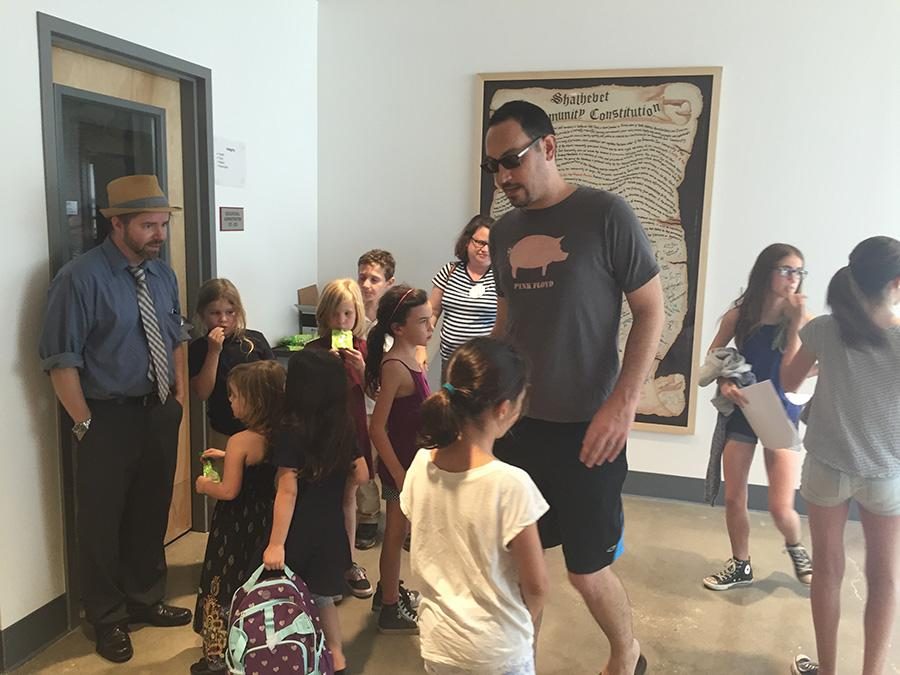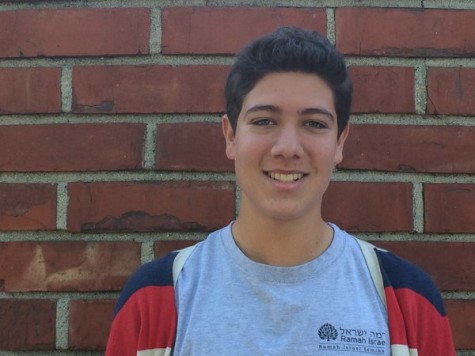Ikar synagogue moves in, overlapping with SWAP
THROWBACK: Ikar’s Hebrew school tried out the Shalhevet building for the first time Sept. 7. Just like last year, they will occupy many classrooms on Tuesday afternoons starting at 3:20.
September 10, 2015
Ikar Hebrew school students stormed Shalhevet’s spiral staircase Tuesday, trickling in after being dropped off in the parking lot and eventually, after getting instructions from familiar faces in the lobby, ascending the spiral staircase in an endless slow parade as the big high school students went whizzing by.
Girls in short shorts and boys in tank tops — unusual dress for Shalhevet — looked adorably out of place next to the 14- to 18-year-olds going in and out of ongoing Just Community sessions. Sophomore Aaron Silverstein, towing his backpack down the steps, zig-zagged to avoid three little girls heading up.
It was the first day of a planned weekly overlap, when Ikar will be taking over most of Shalhevet’s classrooms at 3:20 p.m. for its Tuesday “Limudim” religious school, while the high school holds School Wide Appointment Period, or SWAP, until 4:20 dismissal.
Head of School Rabbi Ari Segal announced last month that Ikar, a 600-family, non-denominational synagogue led by Conservative Rabbi Sharon Brous, would share space in the new building, mostly using it when school is not in session.
Ikar’s High Holiday services are expected to draw about 1,800 worshipers starting Sunday. Childcare will be provided in Shalhevet classrooms.
In an e-mail to the faculty last month, Rabbi Segal explained his reasoning for allowing a synagogue with more than three times as many families as Shalhevet to be tenants in the new building, which opened on time Aug. 14.
“Partnering with another communal organization to share a high-cost and shareable resource (such as our building) sends an important message to the broader community about partnership and shared responsibility,” Rabbi Segal wrote Aug. 2. “Schools and other communal institutions must work together for the qualitative and financial benefit of the community.”
Rabbi Brous of Ikar had a similar message.
“We love the idea of maximizing resources and we love the idea of living a kind of Jewish pluralism,” Rabbi Brous told the Boiling Point in an inteview. “This move actually demonstrates how people with different Jewish perspectives, approaches, and religious practices can be in mutually respectful conversations with each other.”
Rabbi Segal said Ikar would use the Shalhevet campus for Shabbat services, chagim (major holidays), occasional Friday night services, other events and occasional board meetings, as well as its Hebrew school.
He also said the arrangement would start in January. But according to Ikar’s executive director, Ms. Melissa Balaban, Rabbi Segal and Shalhevet Executive Director Robyn Lewis expanded the offer.
“Our original idea was we wanted to make sure that you all could move in and have a chance to settle,” Ms. Balaban told the Boiling Point in a phone interview. “When we said that to Robyn and Rabbi Segal, they said that we could come earlier and it’s a nice space, and as long as Shalhevet was ready, we were game.”
Rabbi Segal said there wasn’t any talk of pushing the start of Ikar’s Limudim program to after Shalhevet ended on Tuesdays.
“This was much more of a collaborative discussion and less of a negotiation,” he said. “It was pretty clear to us that based on their demographics, they really needed to start their Hebrew school earlier.”
On Tuesdays, Ikar will not use the gym, theater or third-floor prayer spaces. Shalhevet adjusted its block scheduling to move SWAP, which used to alternate with Advisory on Thursdays before Mincha, to a weekly slot at the end of Tuesday afternoon.
SWAP is a time designated for students and teachers to have office hours for extra help and makeup tests. For some students it has been a free period, used for homework and co-curriculars.
This week it was used for Just Community Re-Orientation, so only a few rooms were needed and Ikar’s program did not conflict.
It’s not clear what will happen after the holidays.
When asked where teachers would meet with students or give makeup exams, Rabbi Segal, General Studies Principal Daniel Weslow, and Dean of Students Jason Feld were all unsure.
Mr. Weslow speculated that SWAP would most likely take place in the theater, conference room, Beit Midrash, and possibly the gym.
For Shabbat and holidays, the entire building except for offices will be used by Ikar.
There were 1,800 people at Ikar’s High Holiday services last year, Ms. Balaban told the Boiling Point.
Rabbi Segal said students may want to start locking their lockers.
“I know that Ikar shares our values of community and trust, but I would use a lock regardless,” he said. “You could certainly just use it Friday afternoon through Monday morning.”
Senior Daniel Soroudi said that would threaten the spirit of Shalhevet.
“Never once since I enrolled at Shalhevet have I even considered putting a lock on my locker,” Daniel told the Boiling Point. “I see Shalhevet as a very safe and open high school. That’s always been a defining characteristic of our school…
“Changing that safe space in any way changes how I look at Shalhevet, even if just a little bit.”
Although students must clear the classrooms early on Tuesday afternoons, co-curriculars will still take place. Rabbi Segal said the goal is for Ikar to not interfere.
“Obviously, we are the landlord and they are the tenant so we would probably take first priority” if there was a conflict, he said.
He said he’d already told Ikar that there would be times when the Wildfire Theater — whose stage is also the stage for the gym — would not be available, for example.
Ikar will never use offices, the teacher room, or the Student Activities office. The group’s offices will remain at the JCC, where they have been since the shul was founded 11 years ago.
The synagogue has been given its own storage space in the Shalhevet basement, however, and was busy moving boxes in last weekend.
On Sept. 8, Ikar used every classroom, including the Science Labs and the Music Room, for Limudim. Ikar students were eating in every room — unlike Shalhevet students, who have been told not to so the building can stay clean.
Ikar will also be using Shalhevet’s new kitchen, a sensitive area because Ikar does not observe kashrut the same way Shalhevet does. Rabbi Segal said this was solved by requiring that Ikar use agreed-upon hashgachot – that is, kashrut supervising agencies — to certify its pots and food, and that checks would be made at appropriate intervals.
“We’ve made clear that they have to use one of the major hashgachas here in town, or they can have a Shalhevet faculty member supervise them,” said Rabbi Segal. “That was a non-issue. They have been very responsive to what we need.”
Ikar officials, including Rabbi Brous, confirmed this.
“Rabbi Segal certainly knows who we are halachically,” Rabbi Brous told the Boiling Point in a phone interview.
“Our approach to kashrut is very similar to Shalhevet’s and we are happy to abide by their standards.
“We are a community that takes davening and learning and justice really seriously. I think that there is a lot of overlap and very little potential room for conflict here.”
Rabbi Brous said renting space at Shalhevet would cost the shul more than being at the JCC, because Ikar would still be paying the JCC to house its offices.
“However, my board and staff have been very supportive of the idea, even before we saw how beautiful the space was,” Rabbi Brous said. While Rabbi Segal wouldn’t say how much Ikar was paying, he said it was enough for “about 15 to 20 average scholarships” for students in need.
He also said the money would be spent anywhere it was needed, including for new programs and the school’s endowment fund.
Board President Larry Gill called the lease “another revenue source.”
“They are giving us a nice sum of annual rent,” said Mr. Gill.
The lease is for two years with an option to renew, Rabbi Segal said, and was signed by Mr. Gill and the President of Ikar, Karen Hogan.
Meanwhile, in case anyone worries whether it’s halachically acceptable to use a kosher building in a less halachically observant way, Rabbi Segal said that he had yet to receive any such criticism for sharing the building with Ikar.
“I made sure to consult the rabbis who we consult with before making the decision,” Rabbi Segal said, “and so we worked through whatever halachic and hashgafic (ideological) issues there may be.”
Rabbi Brous said there had been no negative reaction in her community either.
“I think there were a couple of people who wondered what it would be like to share space with an Orthodox community,” she said. “Rabbi Segal has assured us that he has only the most respectful and compassionate and kind approach to Jews of all stripes and so our people were very affirmed by that.”
“We are also a halachically serious community so let’s just say, we aren’t building bonfires on the rooftops on Shabbos,” she added. “Because of the religious diversity within in our own community we already have a lot of approaches to making the space one that really respects people of all spectrums and those who are shomrei Shabbat.”














